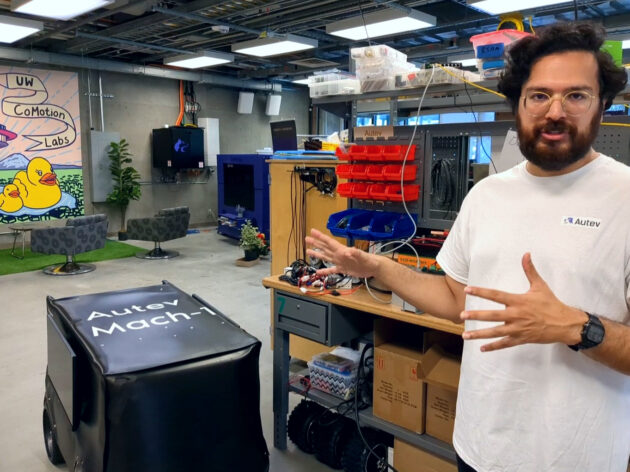
The founders at Autev foresee a future where EV drivers can park their vehicles in a garage, open an app, and input a parking space number. Upon their return, their EV battery will be fully charged.
This futuristic vision relies on autonomous robots developed by the Autev team, capable of charging electric vehicles without human intervention.
“It’s like a gas can on wheels,” said Syd Manna, co-founder and chief operations officer at Autev.
The device is essentially a large, mobile battery equipped with navigational sensors to move independently to a vehicle and boasts a robotic arm with a nozzle that fits into the vehicle’s charging port.
While still in the prototype stage, the Seattle-based startup aspires to be a key player in the expansion of essential EV infrastructure, focusing on providing charging solutions for workplaces, apartments, and condo buildings.
The EV industry is in dire need of more charging stations, but installation can be costly due to the necessity of expensive electrical upgrades to meet high energy demands. Autev’s system offers an alternative, as it uses robots that recharge from a battery-powered docking station, allowing the system to connect to existing power outlets.
“You don’t need to do any infrastructure. It’s a mobile service that’s plug and play,” said co-founder and CEO Osama AlSalloum.

With mobile chargers, any parking spot can be converted into an EV charging stall, eliminating concerns over someone monopolizing a stall equipped with a stationary charger. Users can schedule half-hour reservations for the robotic units, which can recharge approximately 25% of an EV’s battery in that time frame.
The system will feature multiple DC fast-charging robots at each location, allowing some robots to charge EVs while others are docked, recharging themselves.
Autev aims to price the systems at $50,000, including one robot charger and the recharging base. Additional robots would cost between $20,000 to $30,000 depending on the quantity ordered, with each base capable of accommodating two to four robots.
Though still expensive, installing a conventional, slower Level 2 charger can cost between $10,000 to $20,000, while a station with four DC fast chargers can exceed $750,000.
Potential Autev system customers include property owners and managers of residential buildings and office spaces. The team is contemplating offering their system as a service, alongside selling it. Customers could recoup some costs by charging drivers for using the EV chargers.
‘Legitimate effort’

Despite being a more affordable solution, the market remains uncertain.
As EV charging speeds improve, it might become more practical for EV owners in multi-family buildings to use public fast chargers rather than plugging in at home.
Nevertheless, if the team can automate the charging process fully, “it has definite potential. I think it’s kind of a neat solution,” said Matthew Metz, co-founder and executive director of Coltura, a nonprofit promoting EV use.
Metz raised questions regarding the system’s practicality.
Although compact, the charging units are sizable at 5-feet long, 3-feet wide, and 4-feet tall. The charging base requires space, and navigating a crowded parking lot to reach a charging port may be challenging. The Autev team has attempted to mitigate this by designing the robot to connect to EVs from behind and incorporating a highly mobile robotic arm.
Another concern involves potential issues with the autonomous service—if a device gets stuck, or a nozzle fails to engage or disengage—causing frustration for users.
The startup team assured that someone will be onsite for initial deployments to address technical issues. Every unit will communicate with the main system remotely, enabling problem identification and quick response from the company.
“It is a pretty legitimate effort at dealing with a significant problem,” Metz acknowledged, though he anticipates “significant headwinds.”
Charging ahead

Autev launched in October 2022 and has built a proof-of-concept device for slower Level 1 charging, which is manually controlled. They are now working on their second prototype with Level 2 charging and autonomous operation. The aim for the third version is a prototype that provides fast charging and is ready for manufacturing.
The startup founders are currently bootstrapping their effort but plan to raise funds soon. They are targeting production by the end of next year.
The trio met as students in the University of Washington’s Foster School of Business Masters of Entrepreneurship program. Jay Strickland, portfolio analyst with The Energy Authority, serves as a technical advisor.
Autev is based at the UW’s CoMotion Labs in Fluke Hall as part of its Hardware Incubator. The startup utilizes its university setting, with 15 high school, undergraduate, and graduate students working as unpaid interns or for college credits.
Other companies are also developing related EV charging technologies. Automakers Hyundai and Volkswagen are working on robotic EV charging systems, although these devices do not appear to be mobile units or include batteries. Seattle startup Electric Era, which recently won GeekWire’s Sustainable Innovation of the Year award, sells stationary EV charging systems that also rely on batteries.
The Autev team remains optimistic about their future success, highlighting that all components of their system have been proven in other applications.
“We’re just combining it in a unique way,” Strickland said.



